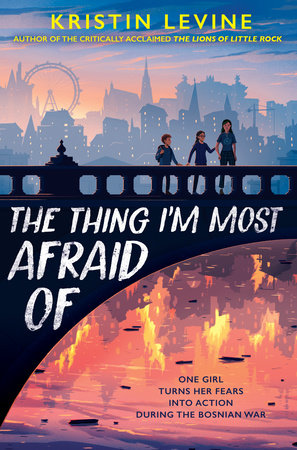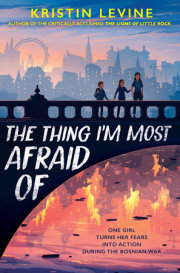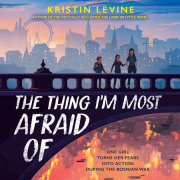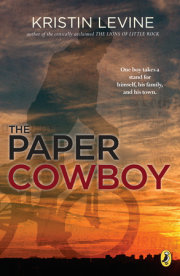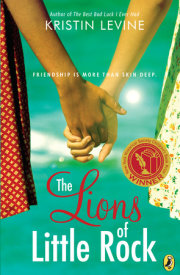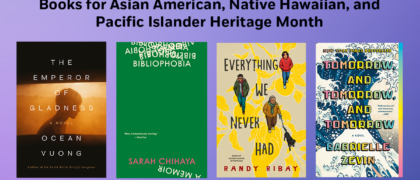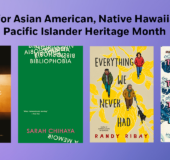Pancakes and Peanut Butter
This had all started last February. Dad and I had gone out for brunch, like we did every weekend I was at his house. It was Valentine’s Day; I remember because I ordered heart-shaped pancakes with strawberry sauce. The bacon was too raw, so I had to send it back, but the next batch was nice and crispy. I was just pouring syrup on my pancakes when Dad cleared his throat and announced that he had gotten a job at the International Atomic Energy Agency in Vienna.
“Vienna?” I asked, stuffing a pancake into my mouth. “Isn’t that near Tysons Corner? Can I walk to the mall from your new office?”
“Not Vienna, Virginia,” Dad said. “Vienna, Austria.”
I kept chewing. Truthfully, I was trying to remember if that was the one with Mozart or the one with kangaroos. I should have paid more attention when we did world geography in social studies. Finally, I swallowed. “Oh.”
“That means,” Dad said slowly, “I’ll be moving overseas.”
I looked up at him. I liked my life just how it was. I liked my dad with his short haircut (he wasn’t military, but a lot of the people he worked with were) and how he traded the suits he wore to work for jeans and an old T-shirt on the weekends. I liked our schedule: Mom’s house on Monday and Wednesday, Dad’s on Tuesday and Thursday, and switching off on the weekends. It worked great! My stomach suddenly hurt.
“I know it’s sudden,” Dad continued, “but I’m really excited about this.”
I didn’t say anything.
“I’ve been waiting for years for a position to open up. And this is my dream job!”
I knew he wanted a response, so finally I mumbled, “Yay. And you’ll get to see some koala bears.”
“That’s Australia,” Dad said.
“Oops.” I stabbed my heart-shaped pancakes with my fork.
“Sweetie,” Dad said. “Austria is beautiful. It’s known for Mozart, Schubert, and Beethoven. It was the home of Sigmund Freud, has amazing coffeehouses and architecture, and was a center of intellectual engagement and—”
“Didn’t it also have Nazis?” I asked.
Dad sighed. “Yes, that’s true. Hitler was also from Austria.”
I folded my arms. “So why would you want to go live there?”
“Maria von Trapp was from Austria.”
“The Sound of Music is Mom’s favorite movie. Not mine.”
“Rebecca.” I could tell Dad was upset, because usually both my parents just called me Becca. “Think of what a great opportunity it would be. To live in another country. Doesn’t that sound interesting?”
“But you and Mom share custody,” I pointed out. “How are we going to handle that?”
“I’ve already spoken to your mother. You’ll stay with her for the rest of the school year and then come visit me for eight weeks in the summer.”
Living in another country for eight weeks sounded a lot more exciting than my normal summer routine of watching TV and hanging out at the pool. And I was lying aboutThe Sound of Music. It was definitely in my top ten. But there was one problem.
Last time I’d gotten on a plane, I’d been seven and we’d been going to see my grandparents in Chicago. I’d totally freaked out, started crying and screaming until I was so hysterical, I threw up. After the visit, Dad had rented a car and we’d driven the two days home. It had been shortly after that plane ride that I had started seeing Dr. Teresa.
“Do you really think I can get on a plane and fly overseas by myself?”
Dad smiled. “That’s what is so perfect about this plan! Your mother has always wanted to go to Europe. And since she’s a teacher, she doesn’t have to work in the summer. So she’s going to fly over with you, drop you off with me in Vienna, spend eight weeks traveling, and then pick you up on the way home.”
What?!
“Isn’t that a great idea?” Dad asked.
I felt dizzy. Why couldn’t I have normal divorced parents who fought with each other instead of worked together to create a secret plan to turn my life upside down?!
“I’ll even hire you a nanny. So you’ll have someone to take you sightseeing when I’m busy working.”
I thought about that. I wasn’t sure if I should be offended that Dad thought I needed a babysitter or excited about having my very own Mary Poppins.
“Becca, I know this is a lot to take in,” Dad said. “And I’m gonna miss you like crazy! But this is a once-in-a-lifetime opportunity for me. I can’t pass it up.”
I didn’t want Dad to pass it up. I wanted to be brave enough to go. “When are you leaving?”
“Two weeks.”
“Two weeks!”
“I know, it’s really soon! But I’ll call and write as much as I can. And you won’t come until school’s out, so that gives you four months to get used to the idea.”
“I’m not going to get used to the idea!”
“Sure you will. Look, for now all I’m asking is that you work with Dr. Teresa on a plan.”
“Fine,” I agreed. “But if this actually happens and you end up hiring me a nanny, she’d better be just like Julie Andrews!”
“Absolutely.” Dad laughed.
After that, we pretended everything was okay. Dad finished his eggs; I drank the rest of my juice. Dad told me all about this old movie starring Orson Welles that was set in Vienna. “You have to see it!” he said. I nodded politely.
But there was another problem. I knew Dad loved me, and we had fun when we were together, but I’d seen how he’d sighed when I sent back my undercooked bacon. I knew he got frustrated when we had to leave the movies because there were too many people. And a couple of months ago, I’d overheard him telling my mom that they shouldn’t buy me tickets to see Les Misérables for my birthday because I’d probably be too nervous to stay for the whole thing and he didn’t want to waste the money. I couldn’t help wondering if maybe Dad sometimes wished for a daughter who didn’t worry quite so much.
The thought rattled around in my head, like a gumball in an almost empty machine, for months. It was still there as I sat in the airport McDonald’s and finished up my Diet Coke. “Penny for your thoughts?” Mom asked.
“Groschen, Mom,” I told her. “Pennies in Austria are called groschen.” Dad had sent me a few coins in the mail. I wanted to tell her my worries about Dad, but I was already so embarrassed about the metal detector. I wanted to say I was going to miss her, but I couldn’t say that either or I’d start blubbering again. Instead I asked, “Do you have your AT&T calling card? With the country codes? No matter where you are, you just dial the number for that particular country and—”
“And it will automatically charge my account. Yes, I know.” Mom rummaged in her blue backpack and pulled out a brown paper bag, which she handed to me. “I brought you something.”
Inside the bag were apple slices, peanut butter and crackers, and three soft-baked chocolate chip cookies. This was the lunch Mom had packed for me every single day of elementary school. Every. Single. Day. In first grade, she’d tried to give me different things, put in a turkey sandwich, or an orange, or Oreos instead of chocolate chip cookies, but I’d always given the offending food away and come home complaining of being hungry. Finally, she gave up.
This lunch screamed home to me like nothing else. The peanut butter smelled so good. Dad had promised to have some peanut butter for me in his kitchen when I arrived.
“I thought you might like some comfort food on the plane.”
“Thanks.” Okay, so maybe a tear or two sneaked out. And I guess Mom noticed, because she wiped them away with her thumb.
“Becca . . .”
“I’m fine!” I said.
“You’re going to have fun.”
“I’m going to miss you.”
Mom came over to my side of the booth and whispered, “I’m going to miss you too.”
We sat like that for a minute, and I started to feel a little better, at least until I heard the announcement over the PA system. “Austrian Airlines Flight 743 to Vienna. Boarding now.”
“Time to go.” Mom wiped her eyes, her voice falsely bright.
“Yeah.”
“I bet you’re excited to see Dad.”
“Yeah.” Thump, thump, thump went my heart. Dad had been methodical about staying in touch (he wrote twice a week, and we talked on the phone every Sunday), but it wasn’t the same as being together. What if he liked it better this way? What if he liked me better when he didn’t have to deal with all my worries?
“I can’t do it,” I cried. “I want to see Dad, but I’m so scared.”
“Oh, sweetie, we’ve discussed this. Flying is safer than driving!”
I hadn’t been talking about the plane—but now I was worried about that too!
Mom pulled me into a hug and sang softly into my ear, “I’ve always longed for adventure, to do the things I’ve never dared. Now here I’m facing adventure. Then why am I so scared?”
I knew that song. It was from The Sound of Music, when Fräulein Maria is leaving the abbey for the first time.
“You’re going to be just fine,” Mom said firmly. She grabbed my arm and marched us both over to the gate agent.
“We are going on a grand adventure!” she announced.
I was so embarrassed, but the gate agent just looked at us blankly. “Boarding passes, please.”
My mom handed her our tickets and then pushed me onto the gangway. I looked back. “Right behind you, sweetie.”
And so I didn’t have a choice except to turn and start walking. I imagined Maria from The Sound of Music, starting out so hesitantly as she leaves the abbey, then gaining strength and courage until she’s literally skipping down the road.
I tried to channel her. I strode more confidently down the walkway toward the plane.
But I didn’t skip.
Copyright © 2021 by Kristin Levine. All rights reserved. No part of this excerpt may be reproduced or reprinted without permission in writing from the publisher.

